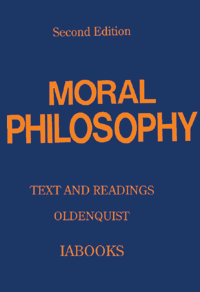Subtotal: 0.0
This volume provides, under one cover, a textbook and an anthology, each designed for a first course in moral philosophy. The textbook, Part One, takes up a series of topics which either are of basic importance to ethical theory or have been found by the author to be interesting and controversial to students, or are both of these. The nine chapters can be read independently of one another; and while some of them contain references to other chapters, they should be thought of more as a menu than as a cumulatively developing textbook. Chapters 4 through 6-`Universalizing,` `Morality and Self-interest,` and `Ethical Relativism`-come closest to constituting a sequence.
Each chapter tries to be an informative introduction to the topics named in its title. Nevertheless, my own interests and opinions get expressed, especially in the latter parts of `Rules and Consequences,` `Universalizing,` `Morality and Self-interest,` `Ethical Relativism,` and `Religion and Morality.` Where my views appear they are offered quite openly as hypotheses and suggestions after the problems have been laid out, and I think there is little danger of their masquerading as received doctrine. In any event, I think I can rely on instructors to tell students where their textbook author is being `objective` and where he has gone mad.
Writers who are not professional philosophers are seldom represented on ethical subjects other than casuistry. In the anthology I offer two such `nonprofessionals`: the psychologist Lawrence Kohlberg, whose `stages of moral development` greatly influenced the field of moral education; and the sociobiologist Edward O. Wilson, whose discussion of hypotheses about the evolution of altruism should, in my opinion, be read by every moral philosopher. In the textbook I offer a third: the novelist/philosopher Ayn Rand (whose actual writings I could not reprint). Most moral philosophers discuss and attempt to refute ethical egoism but rarely, if at all, come up with a genuine ethical egoist to discuss. Ayn Rand is, I think, the best representative of ethical egoism, and in Chapter 5 ethical egoism is discussed and appraised in the light of her theory.
Some of the selections-for example, those from Hume, Butler, Kant, Toulmln, Hare, and Wilson-are explained and discussed at length in the textbook; several are discussed less extensively; and Searle, Foot, and Kohlberg are not discussed. Anthologized authors who get more than passing mention in the textbook (with some inaccuracy I include Rand in this category) are mentioned in the table of contents and are introduced in boldface type where discussion of their work begins in the textbook. Short bibliographies are appended to the biographical sketches of the anthologized authors, and there is an index to the textbook at the end of the book.
The author and the publisher are grateful for the assistance of those who made professional reviews of the manuscript. These review¬ers, to whom we give thanks, were Theodore M. Benditt, University of Southern California; Ronald L. Burnside, Sinclair Community College; Leslie P. Francis, University of Utah; John Kearney, Saint Joseph`s College (Philadelphia); Anthony J. Lisska, Denison University; Paul Seman, Sinclair Community College; and Arnulf Zweig, University of Oregon. The author is grateful to Kenneth Long, Ohio State University, for excellent and good-humored indexing
Preface
PART ONE PROBLEMS IN MORAL PHILOSOPHY
Chapter 1 Agent Morality and Action Morality (Aristotle, Kant)
Chapter 2 Reason and Feeling (Hume, Ayer)
Chapter 3
Rules and Consequences (Kant, Mill, Toulmin)
Chapter 4 Universalizing (Kant, Hare)
Chapter 5
Morality and Self-interest
(Plato, Butler, Kant, Rand)
Chapter 6
Ethical Relativism
Chapter 7
Punishment: Utility and Retribution
(Mill)
Chapter 8
Religion and Morality
(Mill)
Chapter 9
Reasons and Causes
(Wilson)
PART TWO READINGS IN MORAL PHILOSOPHY
Plato
The Republic Book Book II (in part)
Aristotle
The Nicomachean Ethics
Book I (excluding Chapters 10 and 11) Book II
Book III, through Chapter 5
Joseph Butler
Fifteen Sermons Preached at the Rolls Chapel
Sermon XI: Upon the Love of Our Neighbor
David Hume
A Treatise of Human Nature
Book III, Of Morals, Part 1, Of Virtue and Vice in General Section I: Moral Distinctions Not Derived from Reason Section II: Moral Distinctions Derived from a Moral Sense
Immanuel Kant
Fundamental Principles of the Metaphysic of Morals
Preface
First Section: Transition from the Common Rational Knowledge of Morality to the Philosophical
Second Section: Transition from Popular Moral Philosophy to the Metaphysic of Morals
John Stuart Mill
Utilitarianism
Chapter I: General Remarks Chapter II: What Utilitarianism Is
Chapter III: Of the Ultimate Sanction of the Principle of Utility
Chapter IV: Of What Sort of Proof the Principle of Utility Is Susceptible
George Edward Moore
Principia Ethica
Preface (in part)
Chapter I: The Subject-Matter of Ethics, Sections 1-15
Alfred Jules Ayer
Language, Truth and Logic
Chapter VI, Critique of Ethics and Theology (in part)
Stephen Edelston Toulmin
An Examination of the Place of Reason in Ethics
Chapter 10: The Function and Development of Ethics Chapter 11: The Logic of Moral Reasoning
Richard Mervyn Hare
Freedom and Reason
Chapter 6: A Moral Argument (excluding Sections 6.5 and 6.6) Chapter 9: Toleration and Fanaticism, Sections 9.1 and 9.4
John Rogers Searle
`How to Derive `Ought` from`Is`
Philippa Foot
`Moral Beliefs`
Lawrence Kohlberg
`Stage and Sequence: The Cognitive-Developmental Approach to Socialization` (in part)
Edward Osborne Wilson
Sociobiology: The New Synthesis
Chapter 1: The Morality of the Gene (in part)
Chapter 5: Group Selection and Altruism (in part)
Index


Please Login To Write A Review
Login